COVID-19

Push for Shalanda Young for OMB Director, House Vote on Policing Bill Thursday: March 3 Joint Center Roundup
Remembering Joint Center Co-Founder Vernon Jordan
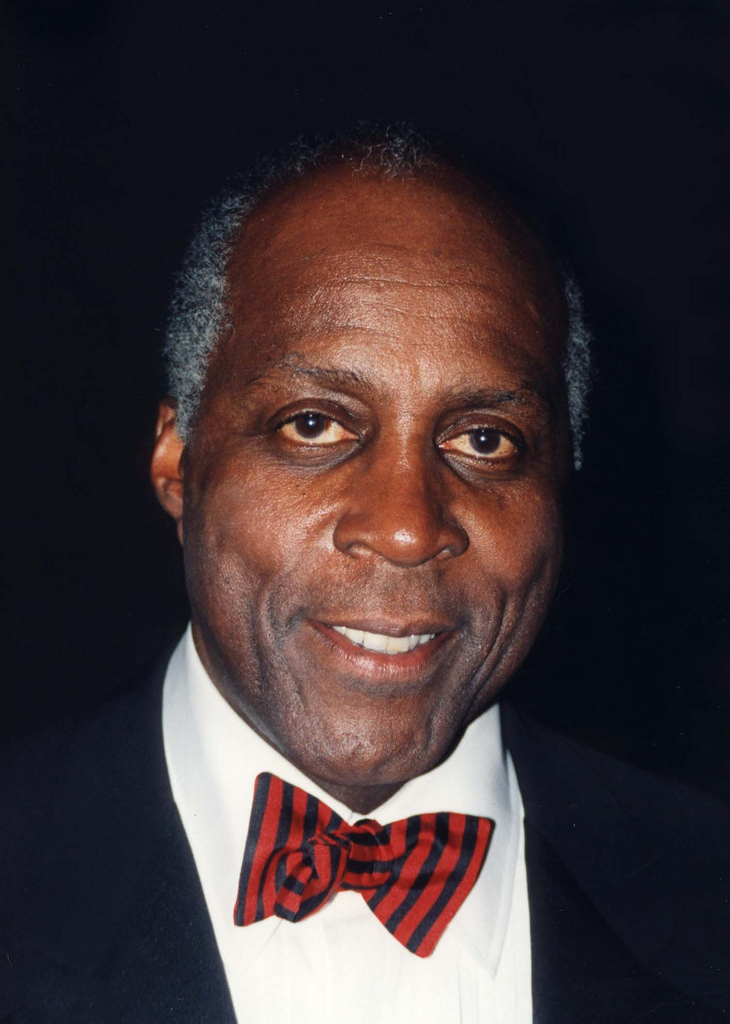
The Joint Center mourns the passing of Vernon Jordan, a civil rights icon, former president of the National Urban League, one of President Clinton’s closest advisors, and a key player in establishing the Joint Center. Mr. Jordan co-wrote the original draft proposal for the Joint Center in 1969 and helped establish our Black Elected Officials roster. Decades later, Mr. Jordan was the master of ceremonies at the Joint Center’s 25th anniversary celebration and served on our Board of Governors. See statements and remembrance from the Joint Center, National Urban League, Howard University, Howard University School of Law (his alma mater), African American Mayors Association, Howard University Political Science Professor Michael K. Fauntroy, The Executive Leadership Council, President Barack Obama, President Bill Clinton, Hillary Clinton, former Xerox CEO Ursula Burns and former American Express CEO Ken Chenault (via New York Times), Stacey Abrams, and many more. Yesterday, PBS also aired a special discussing Mr. Jordan’s legacy with Burns and Charlayne Hunter-Gault.
Biden Administration
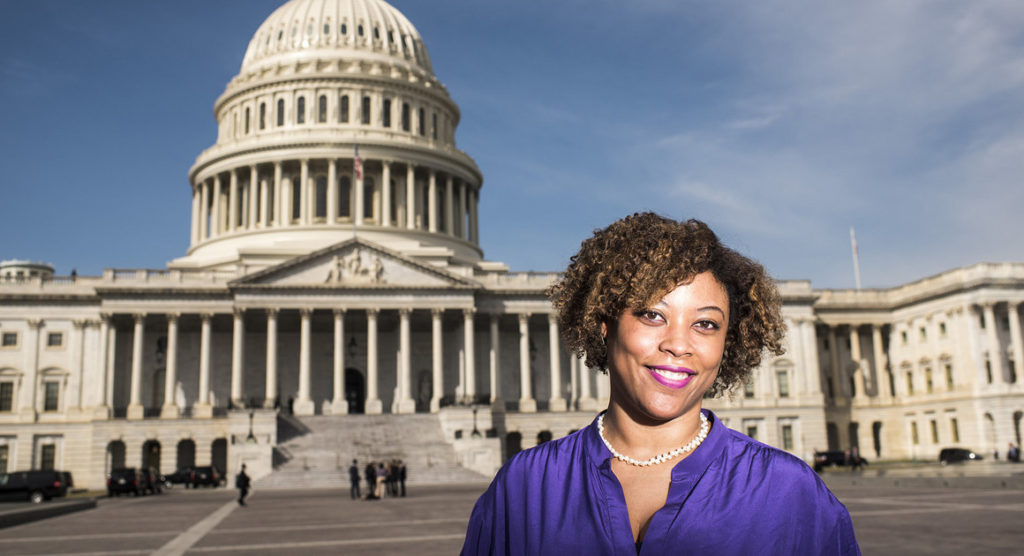
Black organizations and House leaders push Shalanda Young for OMB Director: Following Neera Tanden’s withdrawal to serve as Director of the White House Office of Management and Budget, key policymakers are urging President Biden to nominate Shalanda Young for the cabinet-level position. If nominated and confirmed, Ms. Young would be the first woman of color to serve in the position.
On Wednesday, House Speaker Nancy Pelosi (D-CA), Majority Leader Steny Hoyer (D-MD), and Majority Whip Jim Clyburn (D-SC) sent a joint statement recommending Ms. Young for the role. The Congressional Black Caucus also issued a letter stating they “unequivocally endorse and support” Ms. Young as OMB Director. On Thursday several Black organizations will send the Biden Administration a letter in strong support of Ms. Young (e.g., the Joint Center, NAACP, National Urban League, the Black Economic Alliance, Black44, Black Voters Matter Fund, Black Girl Magic Network, The Links, Incorporated, National Black Justice Coalition, and many more).
Biden originally nominated Ms. Young to be OMB Deputy Director, and her Senate hearing for that position was yesterday. She has earned praise from both Democrats and Republicans. Previously she served as the Democratic staff director for the U.S. House Appropriations Committee, where she played a significant role in ending a 35-day government shutdown and moving coronavirus relief legislation.
House passes stimulus, Biden promises vaccines for all adults by May: The House passed President Biden’s $1.9 trillion stimulus bill, which includes $1,400 stimulus checks for a person earning up to $75,000 or couples earning up to $150,000, a weekly $400 unemployment payment, billions towards rental assistance, and more. The package also includes “billions of dollars to distribute the coronavirus vaccines and to assist schools and local governments.” (President Biden promised that vaccines will be available for all adults by the end of May, and Congresswoman Karen Bass (D-CA) recently emphasized that the vaccine rollout is “failing Black Americans.”) The Senate will reportedly vote on the stimulus bill in the next few days. On Tuesday, President Biden urged Senate Democrats to stay united, and agreed to “disqualify individuals earning more than $80,000 — and households whose incomes exceed $160,000 — from receiving stimulus checks of up to $1,400, lowering the individual income cap by $20,000 from the last round of direct payments and from the version of the aid plan passed over the weekend by the House.”
Biden promises updated infrastructure: After millions of Texans and Mississippians suffered power outages and water shortages during a winter storm, President Biden may move forward with a multi-trillion-dollar infrastructure package to fix bridges, roads, and pipes, and expand access to broadband. The pandemic forced many students, workers, and patients to turn to broadband for virtual learning, telework, telehealth, and access to government assistance applications, and currently 30.6% of Black households with one or more children age 17 or younger lack high-speed home internet (over 3.25 million Black children live in these households).
The Hill

House voting on George Floyd Justice in Policing Act: On Thursday, exactly thirty years and one day after Los Angeles police officers were videotaped beating Rodney King, the House will vote on the George Floyd Justice in Policing Act. This bill prohibits racial profiling, bans chokeholds and no-knock warrants, reduces the standard for prosecuting police misconduct from “willfulness” to “recklessness,” allows individuals to recover damages when officers violate constitutional rights by eliminating qualified immunity, improves federal pattern and practice investigations of local law enforcement, creates a nationwide misconduct registry to prevent problematic officers from simply moving to a new jurisdiction without accountability, mandates collection and disclosure of the use of force data disaggregated by race, and more (summary here). Congressional Black Caucus Chair Joyce Beatty (D-OH) emphasizes the bill’s importance: “In light of what happened to George Floyd and Breonna Taylor, now is the time to get this bill passed and on President Biden’s desk.”
CBC’s legislative priorities: Congressional Black Caucus Chair Joyce Beatty (D-OH) rolls out the “100 Day Plan,” which prioritizes the George Floyd Justice in Policing Act, the John Lewis Voting Rights Advancement Act, and COVID relief in Black communities. It also includes the creation of an internal domestic policy leadership team headed by CBC Chair Beatty and co-chaired by Senator Cory Booker (D-NJ) and Congresswoman Barbara Lee (D-CA). The policy co-chairs, which includes more than a dozen policymakers, will also oversee several committees focused on “issues most important to Black communities.”
CBC Members meet with Vice President Kamala Harris: Congressional Black Caucus Chair Joyce Beatty (D-OH), Congresswoman Nikema Williams (D-GA), Congresswoman Jahana Hayes (D-CT), Congressman Hakeem Jeffries (D-NY), and Congressman Emanuel Cleaver, II (D-MO) meet with Vice President Kamala Harris to discuss the Living Black History initiative and the American Rescue Plan.
Report on Black Women and Girls in America: Congressional Caucus on Black Women and Girls Co-Chairs Congresswoman Robin Kelly (D-IL) and Congresswoman Yvette Clarke (D-NY), as well as Congresswoman Bonnie Watson Coleman (D-NJ) hold a press conference to release the first-ever report on Black Women and Girls in America. The report includes “a collection of essays by Black women leaders who describe critical issues facing Black women and girls” and “recommendations and legislative initiatives to eliminate barriers and promote opportunities” for Black women.
FBI director testifies that white supremacists & far right extremists were responsible for Capitol attacks, not Black Lives Matter: FBI director Christopher Wray’s testimony makes clear left-wing groups did not participate in the violence on Capitol Hill. Wray specifically names the behavior of rioters as “criminal” and proclaims that they have “no place in our democracy.” Acting Capitol Police Chief Yogananda Pittman requests increased Capitol Police funding as “threats against members of Congress have nearly doubled in the past year.”
Appointments
Black women deserve a seat at the table: Essence breaks down how several Black women earned their key positions in the Biden Administration: White House Domestic Policy Council Susan Rice, Chair of the Council of Economic Advisers Dr. Cecilia Rouse, U.S. Ambassador to the United Nations Linda Thomas-Greenfield, and COVID-19 Equity Task Force Chair Dr. Marcella Nunez-Smith. The piece also discusses President Biden’s nominees Kristen Clarke (appointed for Assistant Attorney General for the Civil Rights Division), Dr. Jewel H. Bronaugh (appointed for Deputy Secretary of Agriculture), Brenda Mallory (appointed for Chair of the Council on Environmental Quality), and Marcia Fudge (appointed for Secretary of Housing and Urban Development), who have yet to confirmed by the Senate.
Cecilia Rouse officially becomes the first Black chair of the White House economic council: On Tuesday, the Senate confirmed Cecilia Rouse as the chair of the White House Council of Economic Advisers with a 95-4 vote. Ms. Rouse is the first Black person to chair the Council.

Natalie Madeira Cofield has been appointed to serve as the assistant administrator for the Office of Women’s Business Ownership in the Small Business Administration (SBA). Cofield previously served as the founder and CEO of Walker’s Legacy, the largest digital platform for multicultural women in business.
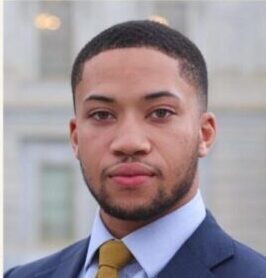
Biden appoints Clement Abonyi, Jr. as a Special Assistant in Legislative Affairs at the Department of Treasury. Mr. Abonyi most recently served as the Director of Member Services to Chairwoman Maxine Waters of the House Committee on Financial Services. As a first-generation American born to deaf immigrants, he received his Bachelor’s degree from The American University School of Public Affairs.

Biden appoints Channing Phillips as acting U.S. Attorney for the District of Columbia, the largest U.S. attorney’s office in the United States. This will be the second time Mr. Phillips will lead the DC U.S. attorney’s office. In 2015, he was nominated by President Obama to serve as U.S. Attorney and served as acting U.S. Attorney for nearly two years as he was never confirmed. Mr. Phillips previously served as a trial attorney in the Department of Justice and as counselor to the attorney general.
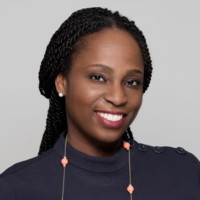
Biden appoints Akunna Cook to be Deputy Assistant Secretary of the Bureau of African Affairs at the U.S. Department of State. Ms. Cook previously served as Executive Director of the Black Economic Alliance, Principal at Drake Road Strategies LLC, Senior Fellow at Third Way, and Term Member at the Council on Foreign Relations.
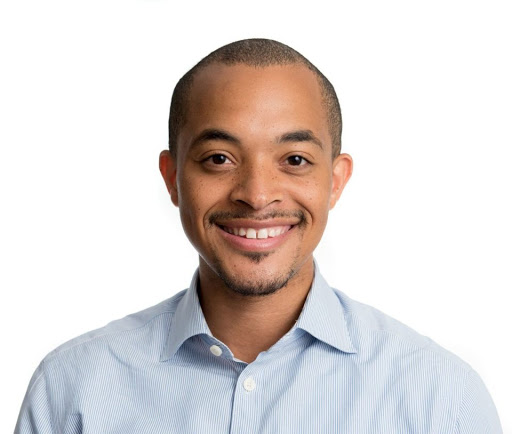
Biden appoints Dorien Paul Blythers as Deputy Chief of Staff for Operations at the Environmental Protection Agency. Mr. Blythers has served over 10 in electoral and issue campaigns. He was previously the Political Director for End Citizens United & Let America Vote, as a Regional Political Director for Kamala Harris For The People, and the Public Engagement Program Manager for Climate Action Campaign.
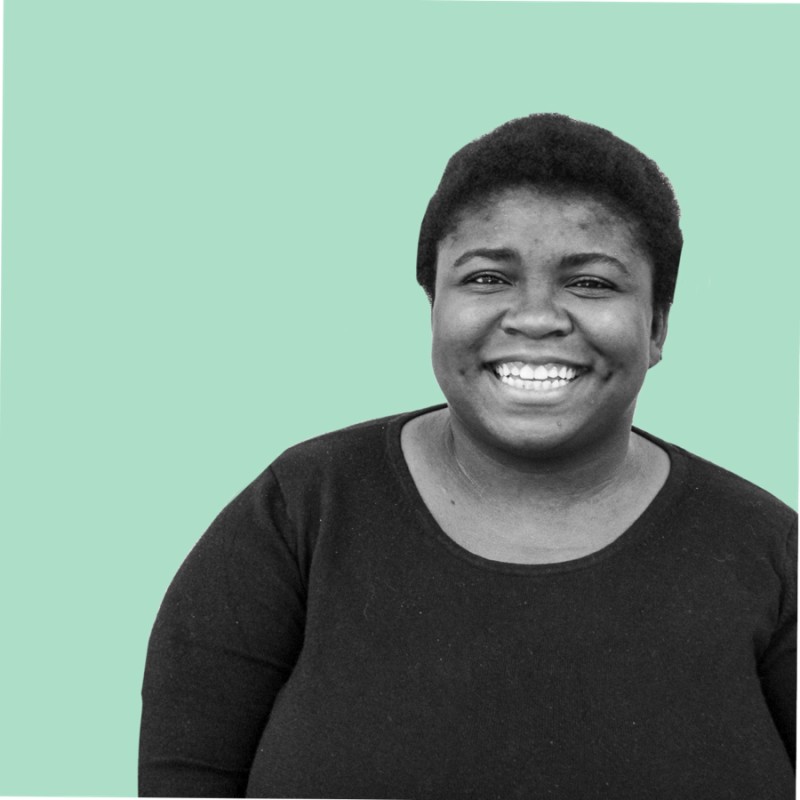
Biden appoints Lavianna Felder as a Special Assistant in the Office of Energy Jobs at the Department of Energy. Ms. Felder most recently worked as the Organizing Director for the 2020 Georgia Senate runoff elections. Prior to that, she worked as the Pennsylvania GOTV Director for the 2020 Coordinated Campaign, as well as the California Organizing Director for Senator Elizabeth Warren’s presidential campaign.

Florence Elizabeth “Beth” Lynk will serve as deputy assistant secretary for public affairs in the Department of Health and Human Services. She played a central role in Planned Parenthood’s 2017 campaign against Obamacare repeal.
Economic Policy
1.2 million newly jobless: New unemployment claims dropped to 730,000 for the week ending Feb. 20, though they are still higher than the pre-pandemic record of 695,000 set in 1982. In addition, 451,000 workers who do not qualify for regular unemployment benefits filed for Pandemic Unemployment Assistance, bringing the total to 1.2 million new claims.
Rent due: Thirty percent of Black renters were behind on rent between Jan. 20 and Feb. 1 (vs. 12.5 percent of white, 20 percent of Latina/o, and 16.6 percent of Asian renters). Nearly half of Black adults had difficulty covering expenses, according to the Center on Budget and Policy Priorities.
A needed raise: Raising the minimum wage would be “transformative” for Black women and Latinas, who represent 23 percent of workers in low-wage jobs, according to the Center for American Progress.
Grim forecast for low-wage workers: New Department of Labor projections chart a devastating future impact of the pandemic on low-wage jobs (which, pre-pandemic, were projected to increase).
“Essential” is not the same as valued: A new scan of low-wage workers in metro Birmingham exposes the growing vulnerability amid the pandemic. The survey by the Adelante Alabama Worker Center is a companion piece to a larger workforce report by Alabama Arise showing how Alabama’s rural Black Belt counties have been slow to recover from peak unemployment.
Help due: Given the critical role Black women played in President Biden’s election, Demos’ Joshua Harmon calls for the president to act now before the window closes to address the needs of Black communities, specifically the loss of Black lives, jobs, and businesses.
Black mothers carry the load: Black mothers are less likely to juggle care with a partner, take a break from employment, work from home, or outsource child care, the Brookings Institution finds.
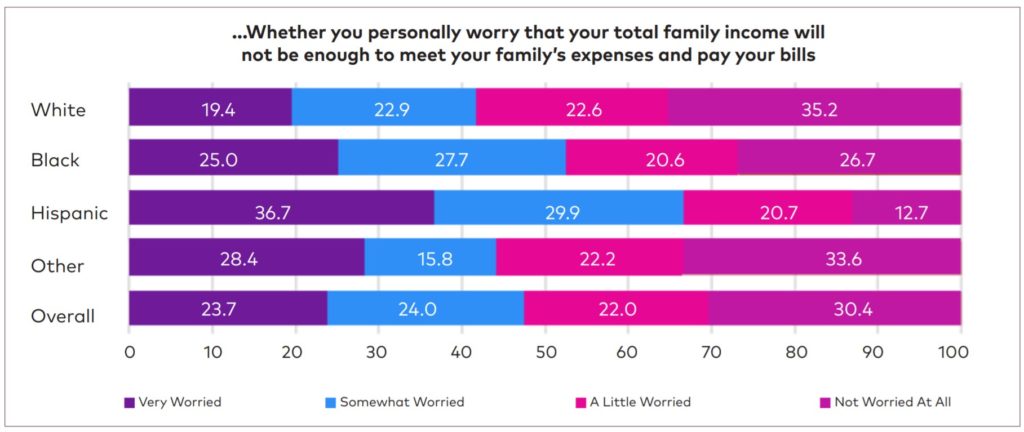
Black women want stability and opportunity: With findings that 25 percent of Black women are very worried about their economic security, a new survey by the Institute for Women’s Policy Research (graph above) says health care, reviving the economy, and job creation are high priorities.
The vital role of child care: Noting that Latinas and Black women are more likely to be sole breadwinners and the main source of financial support in their families, Third Way explores the role of child care in the current economic crisis.
PPP tweaks: Changes to the Payroll Protection Plan, including a 14-day exclusive window for applications from businesses with fewer than 20 employees, is expected to better assist Black and other under-represented business owners.
Rosier predictions: A new survey from Bank of America shows that Black business owners are optimistic about their businesses rebounding, with more than half projecting increased revenues this year.
An outsized impact on Black business: On the other hand, over 1 in 3 Black and Latina/o business owners expect to permanently close within three months, shows a recent survey from the Small Business Majority. COVID-19 has had an outsized impact on Black-owned businesses, which have closed at twice the rate of other businesses.
Closing the wealth gap: Small business ownership can close the wealth gap, says American Banker, but the number of Black business owners had declined 41 percent by June 2020 as a result of the pandemic.
Black economic empowerment: How one entrepreneur in North Carolina is helping Black businesses in the state reach more customers by creating a small business alliance to market and sell their gourmet products.
Black farmers get support: Sen. Cory Booker (D-NJ) is taking action in support of Black farmers. He has reintroduced a bill that, among other things, would create a civil rights oversight board at the Department of Agriculture, and he has joined with Sen. Raphael Warnock (D-GA) in proposing legislation to provide $5 billion in aid to Black and other farmers of color.
Tech Policy
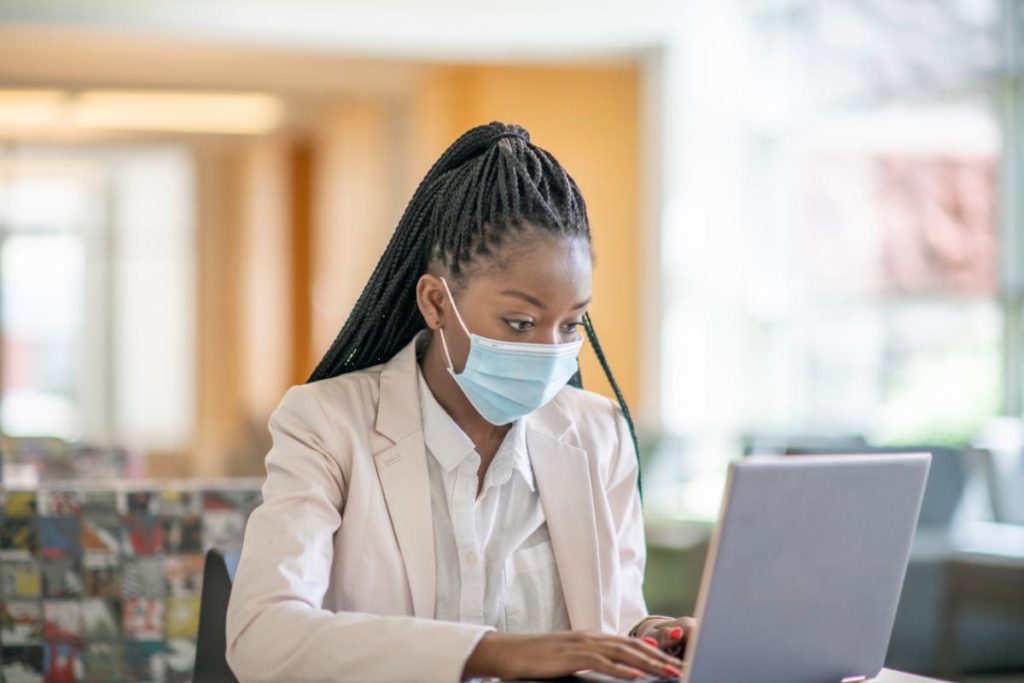
Internet subsidy approved: The FCC has approved a monthly emergency subsidy of $50 for low-income households as part of COVID-19 relief measures aimed at helping families gain access to distance learning, work, and digital health care. Cost is a significant reason why Black people in rural and urban areas lack broadband service.
Movement on broadband access: A former Congressman calls on the Biden administration to make a major push, such as adopting a national broadband strategy, to expand internet access in rural areas. Senators Susan Collins (R-ME) and Jacky Rosen (D-NV) also introduced bipartisan legislation to increase broadband access for homes and businesses in rural areas. Efforts to expand rural broadband access must make sure not to ignore the Black Rural South (rural counties with populations that are at least 35% Black), as Joint Center data show that 46 percent of Black households and 28 percent of white households in these areas lack home broadband.
Close the AI understanding gap: A shared understanding of artificial intelligence (AI) is needed between its creators and the policymakers seeking to regulate it if we are to address racial biases in AI that are raising significant ethical and legal issues, panelists at the World Economic Forum argued.
Self-police, tech companies: Major tech companies should adopt self-regulatory policies, including deprioritizing engagement, labeling misinformation, and establishing community-based enforcement, a professor of responsible artificial intelligence argues. Doing so can limit the spread of harmful information that disproportionately affects people of color.
Future of Work & Learning
Correcting the record: A new report from Lumina Foundation calls for a more comprehensive understanding of student loan debt, with an emphasis on the difference among Black, Latina/o, Asian, and Indigenous communities. The report challenges false narratives about Black borrowers, who lack the parental wealth of their white counterparts and tend to borrow the most, have higher loan balances, and the highest rates of defaults and deficiency
Training for Black entrepreneurs gets a boost: The Black Economic Alliance and Morehouse and Spelman Colleges will establish a training center for Black entrepreneurs on the campuses of the two Atlanta schools.
California college gaps: A report on the state of higher education in California finds that only 60 percent of Black students in the state enroll in college within one year of graduation. Black student graduation rates in the University of California system remain about 20 percent lower than those for white students.
College alternatives needed: New models for career preparation in lieu of a college degree are urgently needed, particularly for women and people of color, New America argues. Only one in five Black adults earns a bachelor’s degree or higher compared with one in three white people and half of all Asian Americans.
Policing Black hair: School dress codes that ban Black hairstyles are racist, Brookings scholars argue. Discipline rates are four times higher and Black students are more likely to be suspended for dress code or hair-length violations than other students.
COVID-19
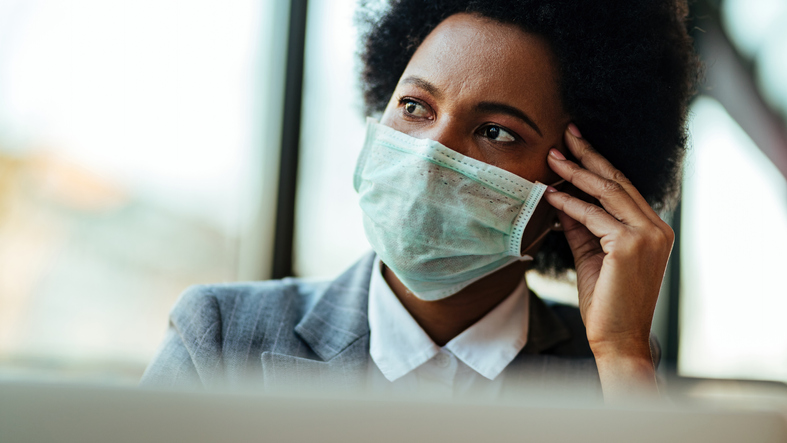
A watershed moment: The emergency use authorization of a new, single-dose COVID-19 vaccine is being lauded as a watershed event in the battle to subdue the virus. Produced by Johnson & Johnson, the Food And Drug Administration’s review of the clinical trial found that the vaccine completely prevents hospitalizations and death from the virus, outcomes that are significantly higher for Black people than white people.
Whites twice as likely to receive vaccine: Racial inequities persist in the vaccine rollout. Of those who have received at least one dose of the vaccine (for whom racial and ethnic identity were provided), 63 percent were white and only 6 percent were Black. By comparison, of the total U.S. population, 60 percent are white and over 13 percent are Black.
Wary for a reason: The history of medical exploitation and abuse of Black people remains a persistent factor in the reluctance of Black people to get the COVID-19 vaccine.
Do better, Ohio: An alliance of civil rights organizations in Ohio is pressing the state to prioritize its Black citizens in vaccine distribution. The Ohio Council of Urban Leagues is also calling for mandatory training in collecting data on race and ethnicity and more collaboration with trusted community organizations to speed vaccinations in Black communities.
A better sign-up system: The Brookings Institution offers ideas for building a more equitable vaccine distribution system, including improved technology and working with health equity experts and the communities impacted to improve appointment registration systems.
#BLM expands support: The Black Lives Matters Foundation is expanding its $3 million COVID-19 financial relief fund by offering $1,000 microgrants to those deemed most in need.
Black children at risk: New data reveal that the disproportionate impact of the coronavirus on Black people also extends to children, with Black children more likely to become severely ill or die from the disease. While severe illness remains rare among children, Black children comprise 11.2 percent of COVID-19 cases and 15.9 percent of deaths.
Black women have suffered most: The toll of the pandemic on the economic security of Americans is most keenly felt by Black women, who are more likely to rely on coronavirus relief than the general population. A survey revealed that 50 percent of Black Americans were counting on relief, while 57 percent of Black women were looking for stimulus help. Nearly 40 percent of Black women have tapped into emergency funds during the pandemic compared with 27 percent of white women, 26 percent of Black men, and 22 percent of white men.
Hill Diversity
Roll Call on Hill diversity: Dr. LaShonda Brenson was quoted in Roll Call saying the bottom line is that “Congress literally cannot effectively create public policy that benefits all Americans if people that are making the decisions do not look like America.” Joint Center Board Member Paul Thornell was also quoted explaining several reasons for the lack of Hill staff diversity, and noting that Members should hire diverse outside advisors to send “a signal to diverse candidates that there’s somebody that looks like me in his orbit or her orbit” and adopt a “Rooney Rule 2.0” which would require at least one person of color to be interviewed for a position.
Report card on top staff diversity of newly-elected Members: As of March 2, the Joint Center’s report card tracking top staff hires by each new Member in the 117th Congress illustrates that 204 of 213 (or 95.8 percent) of the possible positions have already been filled. Of Members who have hired all three top spots, so far Alex Padilla (D-CA) leads in the Senate and Marilyn Strickland (D-WA) leads in the House. Those at the bottom of the lists are Senator Mark Kelly (D-AZ) and Rep. Yvette Herrell (R-NM). Of the top staff hired by new Members so far, 24.0 percent are people of color, and 5.4 percent are African American. People of color account for 40 percent of the U.S. population and African Americans account for 13.4 percent of the U.S.
Movement Building
The heart of democracy: Passing the John Lewis Voting Rights Advancement Act, designed to root out voter suppression and protect voters’ rights, is a critical step in restoring the health of democracy in the wake of former President Trump’s false claims of voter fraud, the ACLU argues.
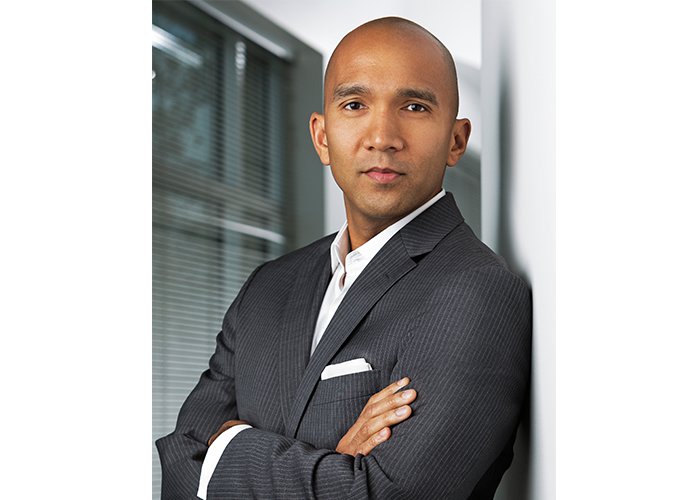
Paul E. Butler has joined New America as its president and first-ever chief transformation officer. Butler brings experience in business development, strategy and operations, with more than 20 years of experience in the media, entertainment and consulting industries.
Black Communities announce their 2021 Black Communities Conference on March 15-24. The agenda includes roundtable discussions on parenting Black youth in the 21st century, Black business and economic freedom, gender and sexuality in Black lives, and ending police profiling and imprisonment.
Center for Popular Democracy issues a petition to the Biden administration demanding an end to the school-to-prison-and-deportation pipeline.
Color of Change issues a petition demanding the Electric Reliability Council of Texas (ERCOT) provide Texans with safe, reliable, and affordable utility service as millions were left without power and reliable access to running water in February.
National Urban League urges constituents to “demand quick action” on passing the American Rescue Plan COVID-19 relief bill.
The Hill hosts a series of conversations with government, civil rights, and social justice leaders on race and racism, inequality, and steps to build a better nation.
The ‘me too’ Movement, National Women’s Law Center, and TIME’S UP Foundation launch We, As Ourselves to “reshape the narrative about sexual violence and its impact on Black survivors.”
The National Urban League releases their health and quality of life program, Project Wellness, to empower Americans to “have access to quality healthcare solutions.”
Young people share their unique challenges of being both Black and Indigenous, including colorism and the erasure of racial identity, as part of the Center for Native American Youth’s observance of Black History Month.
Black athletes are calling their activism and engagement during the 2020 presidential election just the beginning of a movement, not a one-time effort to defeat Donald Trump. Organizations such as LeBron James’s More Than A Vote will continue to leverage their platform for political change, James says.
Events
Upcoming events include “Amend: The Fight for America” (NAACP Legal Defense and Educational Fund, Inc., March 4); “Advancing Fair Housing and Racial Equity through Federal Housing Policy” (Urban Institute, March 5); “The Fifty: America’s Governors” (Politico, March 11).
Last week, events were held by the African American Policy Forum, Adelante Alabama Worker Center and Alabama Arise, Black to the Future Action Fund, Blacks in Technology Foundation and the NAACP, Brookings Institution, Economic Policy Institute, Knight Foundation, NAACP, National Domestic Workers Alliance, Rainbow PUSH Coalition, The Education Trust, The Hunt Institute, Transformative Justice Coalition, and the Urban Institute.
Podcasts
Joint Center President Spencer Overton on Leading a Think Tank Focused on Black America (Blue Tent)
Putting workers at the center of the future of work discussion (WorkingNation)
Should free speech be regulated online (Brookings Institution)
The $1.9 Trillion Stimulus Plan (The New York Times)
The Joint Center thanks the Annie E. Casey Foundation, the Boulé Foundation, the Democracy Fund, Toyota Motor North America, Inc., UPS, and the Walmart Foundation for additional support that has allowed us to do some of our COVID-19 and Black Communities work.
To receive the Joint Center’s emails, sign-up here.

